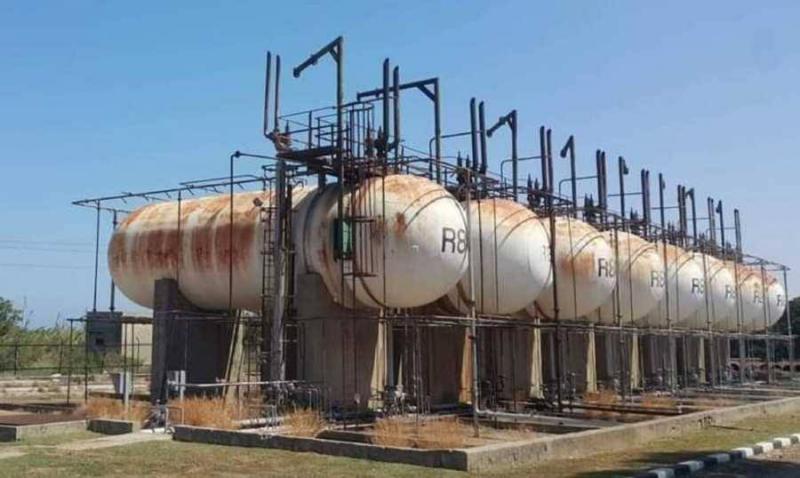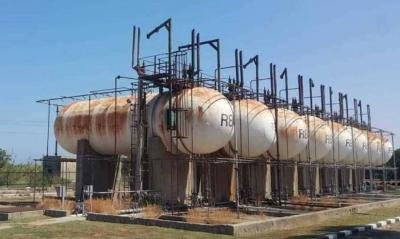While local entities in Tripoli are striving to reopen the oil facilities in Tripoli-Badawi that have been closed for months, their demands are falling on deaf ears. Recently, alarming information emerged about the presence of hazardous and explosive chemical materials stored in 75 containers within the facilities, near the oil tanks. The facility has been closed by a decision from the Minister of Energy and Water in the caretaker government, Walid Fayad, following investigations related to the theft of over 600,000 liters of diesel, according to "Nidaa al-Watan."
Why these materials have come to light now is a topic of debate: some argue that the Beirut port explosion heightened concerns about the dangers of these materials, prompting discussions, even though roughly four years have passed since the port explosion. Others believe that the timing is linked to fears of an escalation in the ongoing war with Israel in the south, potentially extending to other areas and threatening the surrounding Palestinian camps of Beddawi and Nahr al-Bared close to the refinery, leading to heightened calls for action. It’s likely that recent security reports have caused turmoil, raising fears that the aim might be to hinder any potential role for the facilities.
Sources reveal that the German company CombiLift, in cooperation with the Lebanese army, previously inspected these materials. As discussions around these materials intensified recently, residents and local leaders in the Badawi and Tripoli areas organized a protest to demand their removal, fearing that Tripoli and its suburbs could face a disaster akin to the Beirut port explosion.
"Nidaa al-Watan" learned that these materials have not been stored recently but have been present for several years. There is an account suggesting they were transferred to the Tripoli facilities in 2011 with the onset of the events in Syria, though this is contradicted by another narrative based on official correspondence indicating they were brought to Tripoli during the July 2006 war, evacuated from the Beirut port out of fear of bombing at that time. Additional information indicates that the Governor of the North, the union of municipalities in the region, and security leaders were aware of the presence of these materials, which were transferred with the governor’s approval at the time.
Hassan Ghamrawi, head of the Union of Municipalities of the Coast and Mayor of Badawi, told "Nidaa al-Watan": "I have submitted several letters to the concerned authorities regarding this matter, and we have been following it continuously until the Beirut port explosion accelerated our demands." He added: "Does the municipality have the resources and capabilities to transport such materials? Of course not. This is the responsibility of the state, which we are urging through all its agencies to take action. We were informed by the Minister of Energy that he would issue a tender for that. What more can we do? We organized protests and submitted letters, and we continue to follow up. In any case, these materials must be dealt with swiftly; otherwise, we hold the state officials, the government, and the Ministry of Energy fully responsible for any harm that may occur to our regions."
Shadi Al-Sayed, head of the Union of Workers and Employees in the North, emphasized concerns about a desire from Minister of Energy Walid Fayad to permanently close the Tripoli facilities, following the systematic dismantling of state institutions. He noted that many trees had been cut down and transported to Beirut by a decision from former director Aurore Ghali, without any action taken. He expressed that the recent issue of these hazardous materials is just another chapter in the ongoing destruction of facilities, stating: "We mobilized on Sunday with the municipality and residents to demand saving the area from this danger. Here, we ask: Where is the role of the Ministry of Environment? Where is the public prosecutor, the Ministry of Energy, and all concerned parties? Why this negligence towards people’s lives and futures?"
While the Minister of Energy promises to issue a tender, as confirmed by the Mayor of Badawi, informed sources indicate that several international companies, including Italian, Chinese, and French firms, had previously offered to the Ministry of Energy to transport these materials but received no attention. An informed source reveals that the cost of moving these materials is very high, and they cannot be stored except in a proper manner, requiring significant arrangements beyond Lebanon's capacity, necessitating cooperation with countries like France to find a solution.




